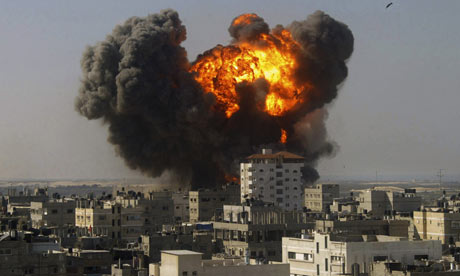 Israel has delivered a report to the UN defending its actions in last year’s Gaza war and insisting its troops did not violate international law, but has not agreed to hold an independent investigation as demanded.
Israel has delivered a report to the UN defending its actions in last year’s Gaza war and insisting its troops did not violate international law, but has not agreed to hold an independent investigation as demanded.In the 46-page report, submitted on Friday and released late that night, Israeli authorities admitted some “operational lapses and errors in the exercise of discretion”. But they strongly denied allegations of war crimes raised by international human rights groups and by two separate UN investigations.
The report reveals there has so far been only one criminal conviction in relation to the war – one soldier was jailed for seven and a half months for stealing a credit card from a Palestinian home and using it to withdraw £250 in cash.
Last September, the South African judge Richard Goldstone published a highly critical 575-page report commissioned by the UN Human Rights Council which accused both Israel and the Palestinian Islamist group Hamas of “grave breaches” of the fourth Geneva convention, war crimes and possible crimes against humanity. It called on both sides to start their own credible, independent investigations or risk international prosecutions. Neither Israel nor Hamas has done so and the UN secretary general, Ban Ki-moon, will report on this to the UN general assembly in the coming days. The three-week war left nearly 1,400 Palestinians and 13 Israelis dead.
Last week Hamas officials in Gaza claimed their forces had not committed war crimes because their rockets only hit civilians by mistake because they were crudely built and unguided. Human Rights Watch dismissed that as a “whitewash” and said it was “factually and legally wrong”.
But it was Israel that received much sterner criticism in the Goldstone report. Two weeks ago the Israeli prime minister, Binyamin Netanyahu, listed the “Goldstone effect” as one of the top three security challenges facing Israel.
The Israeli report seeks to make the case that Israel’s investigative system is rigorous and up to international standards. It blames Hamas for a “deliberate strategy … to blend in with the civilian population” and says the Israeli military made “strenuous efforts” to minimise harm to civilians.
It said 150 incidents have been or are being investigated, of which 36 have been referred for criminal investigation. But, apart from the soldier jailed for “looting”, there have been no criminal charges.
Some incidents were detailed. Israel defended its attack on the al-Badr flour mill, in northern Gaza, which was severely damaged during the war. The Goldstone report concluded this was a “grave breach” of the fourth Geneva convention and a possible war crime. However, the Israeli report admits the building was hit by tank shells but specifically denies it was hit by an air strike, even though Goldstone found that it was. The Israeli report found no need for a criminal investigation into the military’s actions at the mill, but admitted it “could not conclusively determine” whether the building was ever used by Hamas fighters and only claimed “some evidence” of such use.
Israel defended its use of white phosphorus and also found “no basis” to launch criminal investigations over the shelling of UN buildings and staff, even though UN schools were hit during the war, as was the main UN warehouse which was burned to the ground by Israeli white phosphorus shells. Israel has paid more than $10m (£6.25m) to the UN in compensation for the damage.
http://desertpeace.wordpress.com/2010/02/







No comments:
Post a Comment